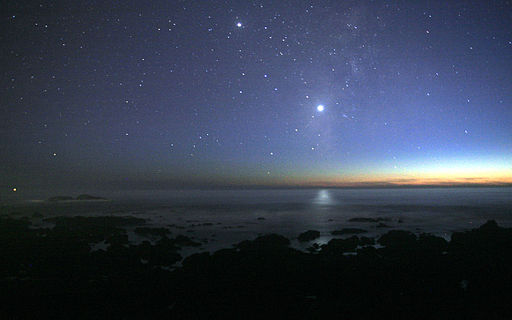 |
| Kurt Stegmüller, CC BY 3.0 via Wikimedia Commons |
As everybody knows, the use of "participial modifiers" and "hyphenated compounds" is typical of Melville's prose in Moby-Dick (1851) and Pierre (1852). Citing Walter E. Bezanson on "Moby-Dick: Document, Drama, Dream" (Companion to Melville Studies) and Warner Berthoff on The Example of Melville, the Wikipedia entry for Herman Melville highlights these elements as important, even defining features of Melville's writing style:
Melville's early works were "increasingly baroque"[87] in style, and with Moby-Dick Melville's vocabulary had grown superabundant. Bezanson calls it an "immensely varied style."[87] Three characteristic uses of language can be recognized. First, the exaggerated repetition of words, as in the series "pitiable," "pity," "pitied," and "piteous" (Ch. 81, "The Pequod Meets the Virgin"). A second typical device is the use of unusual adjective-noun combinations, as in "concentrating brow" and "immaculate manliness" (Ch. 26, "Knights and Squires").[88] A third characteristic is the presence of a participial modifier to emphasize and to reinforce the already established expectations of the reader, as the words "preluding" and "foreshadowing" ("so still and subdued and yet somehow preluding was all the scene...", "In this foreshadowing interval...").[89] After the hyphenated compounds of Pierre, words and phrases became less exploratory and less provocative. Instead of providing a lead "into possible meanings and openings-out of the material at hand," the style now served "to crystallize governing impressions."Our previous Dragooned post on compound modifiers compared the parallel constructions of "all-forbidding quadrangle" in Melville's Pierre and "world-forbidding battlements" in the September 1852 installment of "Scenes Beyond the Western Border." In the same grammatical vein, many more hyphenated compounds (most with participial -ing forms) occur in Scenes and Adventures in the Army--especially in Part II, first published in 1851-1853 as "Scenes Beyond the Western Border."
--Wikipedia/Herman Melville
These are the ones I have found so far:
1. every heaven-born hue --Scenes and Adventures p64
2. ever-restless youth --Scenes and Adventures p67
3. ever-varying policy --Scenes and Adventures p196
4. self-forgetting, thou --December 1851
5. sky-reflecting waters --January 1852
6. a worn and well-singed rug --April 1852
7. the spirit-striving chase --April 1852 [hyphen added in book version]
8. a light dust-bearing breeze --June 1852
9. ever varying and fantastic beauties --June 1852 (no hyphen)
10. A false and self-consuming fire! --July 1852
11. gentlemanly and mild-looking man --July 1852
(hyphen added in revised book version)
12. the spirit-stirring chase
--July 1852 (no hyphen in magazine version; added in revision to book version)
13. ever-heaving surge --September 1852
14. snow-shining spire --September 1852
15. river-feeding rain --September 1852
16. fire-created and blasted, but icy throne! --September 1852
17. blanket-enduring mornings and evenings
--September 1852
18. never-conquered Indians --September 1852
(please don't forget world-forbidding battlements --September 1852)
19. cinder-scattering clouds --March 1853
20. only and all-sufficient revelations --May 1853 [compounds with all- are frequent in Melville's Pierre, including "all-sufficing income"]
21. Heaven-bestowed key --May 1853
22-23. many white-robed fair,— the far-reaching couples
--May 1853
24. far-echoing solemn thunders [--May 1853; "thunders" changed to "voice" in book version: revised to "far-echoing voice"]
25. heaven-descended attributes --May 1853 [deleted in the book version; compare "heaven-begotten Christ" and the "heaven-aspiring, but still not wholly earth-emancipated mood" of Melville's Pierre in Pierre.]
26. cold cloud-attracting and condensing mountain-tops
--August 1853 [here the compound modifier apparently was misunderstood, resulting in typographical error: corrected with hyphen in the book version, Scenes and Adventures, 413]
27. desolation-loving vegetables --August 1853 [compare "utter night-desolation" and "all-desolating" in Melville's Pierre.]
28. — the poor dollar-dealing sinners
(only occurs in book version, Scenes and Adventures p355; added in revision of August 1852 dialogue)
29. ever-heaving bosom --Scenes and Adventures, p65 ["ever" only occurs in the book version, where "ever-heaving bosom" replaces "sullen heaving bosom" from previous two magazine versions (1835 Military and Naval Magazine and July 1842 Southern Literary Messenger).]
30. heaven-bestowed beauty --Scenes and Adventures p364 (occurs only in the book version, in revised dialogue from the August 1852 installment of Scenes Beyond the Western Border.)
31. crowd-created and encouraged pleasures --Scenes and Adventures p65; occurs only in the book version.Honorable Mentions from May 1853 :
gala-gloss to all surroundings
glaring ball-room mockery
 |
| Scenes Beyond the Western Border Southern Literary Messenger Volume 18 - September 1852 |
The September 1852 installment of "Scenes Beyond the Western Border" displays at least six hyphenated compounds, the most of any single installment in the series. The next biggest cluster (at least five instances) appears in May 1853. As noted already, such hyphenated compounds prominently contribute to the mannerist style (sometimes termed rococo) of Melville's Pierre, first published in August 1852.
Impressive as the September 1852 group is (for example "snow-shining spire" and "world-forbidding battlements"), I love the May 1853 instances best of all, in particular those employed in describing the fantastic scene adapted from Dante's Paradise:
...the many white-robed fair,— the far-reaching couples, floating in that fairy dance, revolving,—like the moon around the sun, in circling circles.Then again, dollar-dealing sinners is hard to top, something added later in revision of the August 1852 dialogue.




